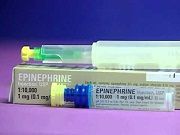Article
New Epinepherine Kit Shows Strong Results at Cheaper Price
Author(s):
A California-based company has taken the final step toward bringing a cheaper epinephrine injection kit to the American market.

A California-based company has taken the final step toward bringing a cheaper epinephrine injection kit to the American market.
The US Food and Drug Administration will now review the company’s new drug application and decide whether to approve its prefilled 0.3 mg syringes for the emergency treatment of anaphylaxis and all other type 1 allergic reactions.
The FDA has already approved 4 types of epinephrine auto-injector: the EpiPen (and EpiPen Jr.), the Auvi Q, the Adrenaclick and a generic version of the Adrenaclick.
For consumers, however, the kits are fairly expensive. The cheapest can cost several hundred dollars for a two-dose kit, and even patients with insurance often feel the pinch. Co-pays for the kits can exceed $100.
Adamis Pharmaceutical Corp. has yet to announce what it would charge for its product, but executives say their market research indicates substantial demand for a significantly cheaper product.
The company will also reportedly tout the relative simplicity of its product which, as a syringe and needle, is designed to be a change for customers confused by auto-injectors.
The company has not speculated publicly about what percentage of customers, if any, would actually prefer syringes to auto-injectors. The noted that current research does indicate that, for all the efforts to make auto-injectors foolproof, many people struggle to use them properly.
Existing auto-injectors differ slightly from one another, but they have all operated along the same basic premise since the 1970s, when an inventor named Sheldon Kaplan devised a pre-filled, spring-loaded syringe for military use.
Kaplan soon realized that the same technology that helped soldiers quickly inject themselves with nerve-gas remedies could help civilians perform injections on themselves. The first EpiPen arrived in 1980 and, despite the arrival of similar competitors, it has dominated the $250 million market for epinephrine injectors ever since.
Oddly enough, Kaplan’s original product convinced the military to abandon the design that Adamis has chosen for its epinephrine injector: a normal syringe, filled in advance with the proper amount of medication. This replaced prior military protocols which included using a prefilled syringe during World War II and filling empty syringes with medicine from a vile during a battle.
The idea for using epinephrine to treat severe breathing problems such as anaphylaxis is even older. It dates back to around 1900.Even after all that time there is still research to suggest that epinephrine injection kits are still dramatically underused.
A cohort study published in the Annals of Allergy Asthma and Immunology found that only 36.6% patients who went to emergency departments with anaphylaxis left the hospital with prescriptions for epinephrine auto-injectors. Other studies have discovered similar figures.
Even when patients do receive prescriptions, they often fail to carry the devices with them. A number of studies conducted in both the US and Europe have asserted that less than half of all people who are prescribed epinephrine auto-injectors actually have them at all times.
Some research suggests the high cost of the products may prevent some patients from filling their prescriptions or replacing injection kits that have expired or been stored improperly.





